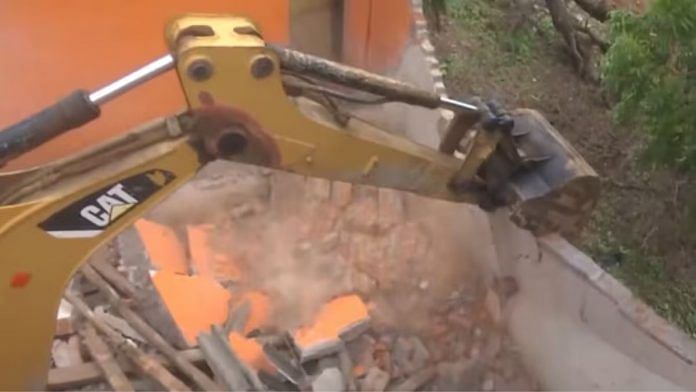Recently, a video went viral on social media where a local-level Madhya Pradesh politician, Pravesh Shukla, was seen urinating on a hapless, mentally challenged Dalit man. This disturbing video shocked the nation, leading to widespread outrage and condemnation of the reprehensible and barbaric act.
The immediate response of Madhya Pradesh Chief Minister Shivraj Singh Chouhan and the police of initiating strong legal action against the accused was widely appreciated. Rightly, Shukla was arrested by MP Police and charged under relevant sections of the Indian Penal Code and the Scheduled Castes and Scheduled Tribes (Prevention of Atrocities) Act, laws meant to protect India’s socially oppressed communities.
The incident served as a poignant reminder of the deep-seated and persistent prejudices and discrimination prevalent in our society, particularly against people belonging to historically marginalised castes, tribes and communities. It shed light on the unfortunate reality of continuing atrocities being inflicted upon them in various parts of the country and an enduring curse of arrogance that persists among certain sections of society, perpetrating social divisions and hindering our social progress toward a more equitable and inclusive India. The fact that it was perpetrated by a political figure like Shukla, a BJP leader, added to the fireworks and the polemics.
Was Chouhan’s ‘bulldozer action’ necessary?
However, what stirred controversy and raised questions was the subsequent clamour for “bulldozer action” and the invocation of the National Security Act (NSA) against the accused. By now, many states in the country have normalised resorting to high-handed actions, and if not curtailed, the bulldozer can well become the symbol of their justice system. Demolishing a portion of Shukla’s house surely sent a political message but undermined the principles of due process and the rule of law. Moreover, the invocation of NSA against him seemed to be absolutely out of place. Under the law, NSA is only invoked to detain and prevent a person from undermining India’s security, defence, and relations with foreign nations, maintaining public order, or supplying essential supplies. While the accused’s actions were heinous and condemnable, there appears to be no logic in invoking NSA in this particular case.
Whenever an offence is committed, it is the duty of the state to initiate the process of investigation and prosecution under appropriate sections of substantive and procedural law. Adhering to due process, fair trial rights, and the principles of justice would ensure that the accused is held accountable without compromising the fundamental principles that underpin our constitutional and legal system. We must remember that the rule of law is the cornerstone of any civilised society, and any deviation from this principle, no matter how well-intentioned, can lead to chaos and anarchy. The need of the hour is a balanced approach to law enforcement, one that is not only swift and decisive in its response to crime but also upholds the principles of justice and due process, as enshrined in the Indian Constitution. There is no place for dramatics and vigilantism in law enforcement.
Also read:
States aren’t vigilante organisations
Much has been written about the recent practice of instant justice and bulldozer justice in certain parts of India. Experts have questioned its legality and how it is carried out, often without notice or following due process. Demolitions as a punitive action, without following law and procedures, contravene established constitutional norms and the principles of criminal justice. The right to property, protected by the Constitution, and the principle of reasonableness and due process, are often ignored in these cases.
Apart from the frequent misuse of Preventive Detention Laws like the NSA, a common but illicit practice observed in many states is the act of ‘padding up,’ whereby additional sections of the law under unconnected heinous offences are added at the time of registration of FIRs, in an attempt to artificially ‘strengthen’ the case. On the other side of the same coin is the practice of watering down the gravity of crimes committed by influential people, when cases are deliberately registered or charge-sheeted under less severe sections of law. Consequently, citing these grounds, the courts dismiss many such cases. It is crucial that our police avoid unnecessary theatrics, in order to ensure objective investigation and the fair delivery of justice.
The State is not a vigilante organisation. In the pursuit of justice, it is imperative for the State to always uphold the principles of due process and the rule of law instead of resorting to dramatic punitive action. While promptly bringing perpetrators to justice is crucial, it should not come at the cost of compromising the very principles that govern our criminal justice system.
Prosecuting criminals under appropriate sections of law ensures that justice is served while safeguarding the integrity and fairness of our judicial process. The State’s commitment to these principles is vital for maintaining societal order and fostering trust in the legal system. Conversely, deviating from these principles, even when dealing with the most heinous of crimes, undermines the integrity of the justice system, leading to miscarriages of justice, the punishment of innocent people, or disproportionate penalties.
Upholding the rule of law not only nurtures public trust in the justice system but also ensures that punishments are meted out fairly and objectively, protecting the fundamental human rights of all individuals, including criminals.
N. Ramachandran is a retired IPS officer and the president of the Indian Police Foundation & Institute. Views are personal.
(Edited by Zoya Bhatti)



